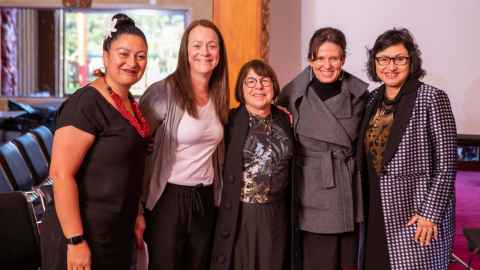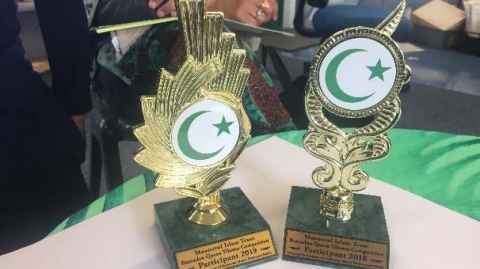Funding boost helps teachers 'see' strengths of children
17 October 2019
A pilot intervention led by the Marie Clay Research Centre has received additional funding from Auckland Airport Community Trust for 2020.

Professor Janet Gaffney and colleagues from the Marie Clay Research Centre launched a small pilot intervention earlier this year with the help of philanthropic funding from Auckland Airport Community Trust and has now secured funding to extend into a second phase.
"Understand Me: Storied Conversations of Tamariki/Children, Whānau/Families and Kaiako/Teachers" uses the concept of "sharing a memorable story" to help teachers "see" the strengths of families and children, who often have experiences and cultural backgrounds different to their own.
The pilot involved a primary school in the West Papatoetoe Kāhui Ako (Community of Learning). The second phase (1 January 2020 – 31 December 2020) aims to integrate the work into the life of the school.
The article below describes the research (as published in the Auckland Airport Community Trust’s 2019 Annual Report).
If they can’t understand me, how can I understand them?
We began our journey for this study with a seed of an idea, inspired by a quote from a Māori student regarding his teachers, “If they can’t understand me, how can I understand them?”1 If our stories are "us" and we craft ourselves and worlds in stories can a teacher better understand a child’s world after they share an important memory? Will a parent “see” a teacher differently when the teacher conveys a vivid story of her 7th birthday with the parent’s daughter, who had just celebrated her 7th year? Will the shared stories shape the daughter-teacher relationship? The daughter, more trusting of the teacher, having witnessed her mother’s growing trust in this teacher.
We were fortunate to find true partners with whānau, teachers and educational leaders in Papatoetoe North School (50% Pasifika, 21% Māori and 25% Indian, and 38% of the children with heritage languages other than English), who would engage as fellow travellers on this journey to listen intently to those with experiences different from their own. Imagine, simply, a child, their whānau and teacher—their stories, their listening, their conversations. Fifteen children, their families, and teachers deepening their relationships through storied conversations. The students in the school reflect the superdiversity of Auckland.
A father started a second story-sharing session with a powerful declaration of his enduring commitment to his children. He shared with his young son and his son’s teacher that he had decided long ago to be a different father to his children than the one he had. “People tell others who they are, but even more important, they tell themselves and then try to act as though they are who they say they are.”2 Storied conversations make space for children, parents, and teachers to construct their identities in relationship to one another.

Some children, whānau and teachers brought a precious photograph or an object. A first storied conversation session revealed one child’s everyday experience of attending what she called “culture class” at a local mosque. In the second session, the child chose to bring trophies that represented her achievements in her Muslim community. Artefacts carry stories that are connected to the lived experiences of children and their families.
One young girl drew this drawing while recounting her whānau visit to the Ihumātao protest camp. She portrayed herself as the story-teller by positioning herself as a central figure. She coloured herself and her teacher both red to highlight their relationship, whilst she coloured her mum purple to convey a different relationship and positioned her mum between herself and the teacher. She then drew herself again, this time coloured bright yellow, depicting her memory as she held the flag while she and her whānau entered the Ihumātao protest camp.
As we continue our series of “storied conversations” in partnership with Peter Conroy, (Principal), Marieta Morgan (Deputy Principal) and the tamariki/children, whānau/families and kaiako/teachers of Papatoetoe North, we are privileged to witness the ethic of care in this school community in which the school is a community honoured, inclusive space. We, as facilitators/researchers are grateful to partner with Auckland Airport Community Trust on this innovative project and are excited to build on the momentum for a second year.
1Children’s Commissioner’s 2018 report, Education Matters to Me.
2Holland, D., Skinner, D., Lachicotte, W., & Cain, C. (1998). Identity and agency in cultural worlds. Cambridge, MA: Harvard University Press.
Part of this article was first published in the Auckland Airport Community Trust's 2019 Annual Report and republished with permission.